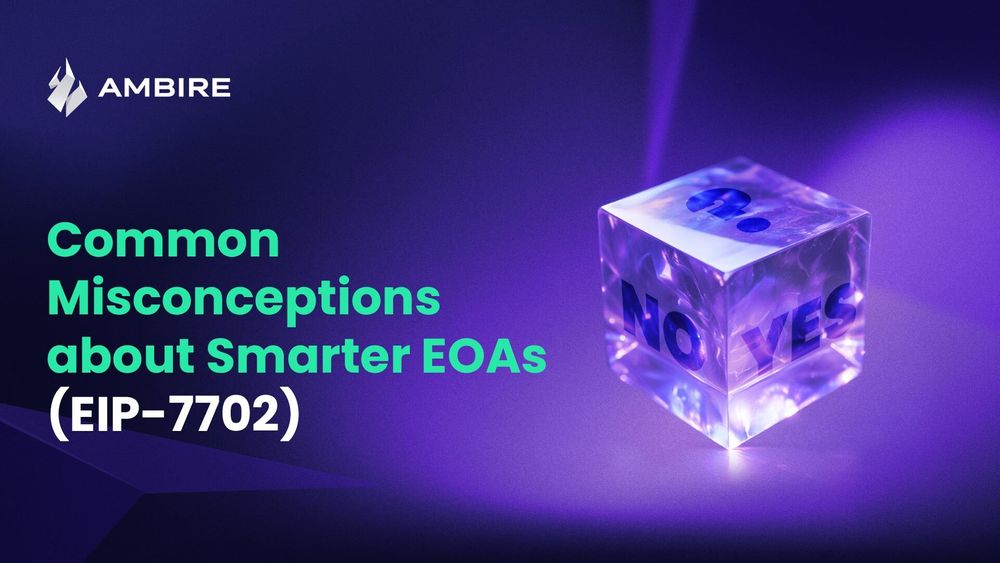Common Misconceptions about Smarter EOAs (EIP-7702)
Soon, you can upgrade EOAs to enable smart functionalities thanks to EIP-7702, part of Ethereum's Pectra upgrade coming soon. We break down common misconceptions and provide additional information.

The much-anticipated Pectra Ethereum update is coming, and it brings smarter EOAs (EIP-7702), a.k.a the possibility to upgrade EOAs to enable smart functionalities - e.g., transaction batching, gas abstraction (being able to pay gas in stablecoins, e.g.), etc. While this is exciting news, EIP-7702 is rather complicated, and as a result of not understanding it fully, the Ethereum community still has doubts about whether smarter EOAs are actually the next best thing or if they have hidden traps.
We already explained in detail what EIP-7702 brings for wallets, and with a tentative release date for Pectra as soon as the end of April 2025, we decided to debunk some of the most common misconceptions to allow users to make educated decisions and to better understand the benefits of smarter EOAs. Let’s dive in:
Misconception: EIP-7702 will compromise the security of my EOA
Far from it, actually. People may think that delegating to a contract is practically giving away control and trusting a piece of external code. But in reality, all accounts have logic, including standard EOAs. They just have protocol-level logic to check your signature and nonce. EIP-7702 simply takes this logic to the application level with transaction batching and alternative gas fee payment options. With the right implementation, this isn’t all that different from EOAs when it comes to security.
Furthermore, EIP-7702 eliminates infinite ERC-20 approvals thanks to EIP-5792. This allows apps to ask a wallet to process a batch of transactions, requesting seamless approvals for exactly the needed amount, and they are signed together with the action you're performing. Ambire Wallet, for example, has been offering this for smart account users for a few years now, thus preventing theft of funds, and we’re excited to also offer this for EOAs as soon as Pectra goes live:
🔴 $417M has been stolen due to unlimited token approval exploits since 2020 according to @RevokeCash
— ambire.eth (@AmbireWallet) September 26, 2024
It's time to eliminate the need for managing token approvals! 🔐
Solution 👇 https://t.co/19rAYqsoG8
And while eliminating ERC-20 approvals is big, it's not the whole story. Let's say your account is on your hardware wallet. Thanks to session keys and spending limits, you can program it so that you can interact with Web3 in a limited way, without having to always sign on your hardware device. This reduces social attack vectors. No more pulling your Ledger out at Devcon (or worse).
Misconception: EIP-7702 allows apps to drain my wallet
Another common misconception is that you would delegate to a dApp and that dApp would be able to perform malicious activities with your account. This is, however, not true - the general consensus is to only allow wallets to manage delegations. And wallets wouldn’t allow this for multiple reasons: it’s dangerous; delegation needs to be changed for every single dApp; the dApp does not benefit from running code from your account, but the wallet does (because you can batch transactions, pay for gas in non-native tokens, etc.); wallet implementation needs to be aware of each dapp-specific contract.
The reality will be that dApps will ‘talk’ to wallets via extended capabilities (EIP-5792, we mentioned earlier, paymasterService, EIP-7715, EIP-7710), and wallets will use their own implementation to achieve this at the account level. This is exactly how it works now: dApps tell the wallet what they request, and the wallet deals with the nitty-gritty of actually managing the account.
This is the single biggest myth about EIP-7702: the general consensus is that delegations will only be managed by wallets, never apps.
— Ivo 7702/acc ⚔️💜 (@Ivshti) March 5, 2025
So apps won't be able to brick/drain/etc.
btw I can be proven wrong by a wallet team that intents to allow that https://t.co/FkiGm6MlUR
Misconception: EIP-7702 removes portability
Yes, smart accounts aren’t portable yet. But EIP-7702 and smarter EOAs are not account abstraction, and they’re not smart accounts. It’s just enabling smart account features for EOAs. As such, EOAs remain portable even with EIP-7702 enabled.
Do keep in mind, though, that even if you import the same EOA in multiple wallet providers at the same time, you will only be able to use smart capabilities on one of these providers, and you can use it as an EOA everywhere else. While there are efforts to solve this for both smarter EOAs and smart accounts, this is already a huge improvement to the current status of no portability for smart accounts and will satisfy the needs of most people.
Sort of misconception: You cannot rotate keys with EIP-7702
This is technically not a misconception; it is true. However, it’s given way too much importance. EIP-7702 is a way to upgrade existing accounts. Those accounts can not migrate from the one key model anyway because of how EOAs are set up.
So, while EIP-7702 brings no change to key rotation directly, it provides a potential path to migrate to actual multi-key/rotating-key smart accounts by transferring tokens with transaction batching in one go in the future. And this is an improvement to the current status quo!
Misconception: My smarter EOA will go back to a regular EOA after a 7702 transaction
This misconception comes from the fact that EIP-7702 has changed since it was first introduced. Originally, the EOA was meant to only temporarily become a smart contract (as a new transaction type), unlike the current version, where the switch is more permanent. It is still possible to “revert” to an EOA or switch the smart contract to a different one, but this requires signing and sending another EIP-7702 delegation.
While this sounds like a technical detail, this property of the EIP allows verifying advanced signatures via EIP-1271, which opens up use cases like signing messages with alternative signer keys (e.g., passkeys). However, if a dApp doesn’t support smart contract signatures, you can still fallback to classic EOA signatures without revoking your delegation. This is because the account can produce both types of signatures at the same time. In this regard, EIP-7702 is pure magic - the best of both worlds.
Misconception: EIP-7702 is native account abstraction
First, let’s look at what native account abstraction is. In short, it allows smart accounts to originate transactions (so they can be the `tx.origin` of transactions). But this isn’t what EIP-7702 does. Whether a smart account or a smarter EOA, they still need a relayer, a bundler, or an EOA that converts user intents into actual transactions.
While EIP-7702 gives EOAs the native ability to turn into smart accounts, which may sound like native AA, it definitely isn’t because it still doesn’t allow them to originate transactions.
Misconception: The upgrade to a smarter EOA will be expensive
It is true that operations (or transactions) for smart accounts are more expensive than EOA transactions due to their more complex nature. The upgrade to a smarter EOA does require a transaction comparable to a smart account transaction, but if you look at the big picture, being able to batch transactions and broadcast them as one will mean significant gas fee savings in the long run. It’s a trade-off that will pay itself off!
Best of all, EIP-7702 allows wallet providers to choose how they want to broadcast the transaction: if batching or gas abstraction is not used, it can choose to use EOA mode, therefore not increasing gas usage unnecessarily.
Not only this, but EIP-7702 can also help reduce the cost of initiating smarter EOAs by up to 10x, compared to a regular smart account, and can further save fees by sending regular transactions rather than the more expensive UserOp:
One underrated aspect of EIP-7702 is how it may make smart accounts practical on Ethereum mainnet for the first time.
— Derek Chiang | ZeroDev (@decentrek) February 21, 2025
Right now, it costs ~150k gas to deploy a smart account, which (assuming a gas price of 3 gwei) is about ~$1.20 on mainnet with today's ETH price. For DApps who…
Misconception: EIP-7702 replaces ERC-4337
4337 was by far the most popular AA standard before 7702 came along. You may assume that they’re competitive since talk about 4337 has now gone quieter in favor of 7702, but in fact, the two proposals are actually complementary and live happily side by side.
EIP-7702 allows smarter EOAs to turn into smart accounts but they still require a 3rd party, a relayer, to originate transactions, as we mentioned earlier. And this is where ERC-4337 comes to shine - because it standardizes interactions between smart accounts (be it smart account or a smarter EOA), and relayers, allowing any 4337-enabled smart accounts to work with any 4337 relayers (or bundlers).
What does this mean in reality? If a wallet doesn’t have its own relayer or has not implemented ERC-4337, an EIP-7702 smart account won’t be able to send transactions using this wallet. Ambire wallet, e.g., has both - its own relayer and ERC-4337 support, making it an ideal choice for managing smarter EOAs and being 7702-ready from day one!
In conclusion
EIP-7702 has so many practical benefits for the Ethereum ecosystem, opening new doors and simplifying the account abstraction experience: it provides extra security, allows for account recovery, offers automation and convenience, etc. And while users may be skeptical about it, this skepticism mostly stems from not understanding how smarter EOAs will actually work. EIP-7702 is coming, opening the doors to a better Web3 and paving the way for further innovation!
